Redditor Lets Go Of Her Partner's Large Dog To Avoid Being Injured, Gets Accused Of Trying To Kill It
Owning and training a hyperactive dog has its challenges. OP has a large, 14-month-old dog they only got 7 months ago and have been struggling to train.
The dog is very hyperactive, and walks are taken regularly to tire it out. OP's partner knows how easily the dog gets excited and has agreed that when OP is the one walking it, it shouldn't be called from a distance because OP is too small and weak to hold the 13-stone beast if it pulls them over.
On one walk, OP's partner called the dog from 30 feet away while it was stopped to pee. The dog got so excited that it yanked OP, who was trying their hardest to hold it due to elderly people walking nearby and the fact that the puppy is a 'jump and kiss' kind of dog.
OP was about to go flat on their face when they let go, but the dog was fine and didn't jump up; instead, it peed somewhere else. OP expressed their disapproval of the decision to call the dog from so far away when their partner had seen them fall before and stated that a simple apology would have gone a long way to prevent making the situation so serious.
OP's partner was adamant that they were in the wrong and accused them of nearly killing the dog. Read the full story below:
OP asks:

OP has a large, 14-month-old dog they only got 7 months ago and have been struggling to train.

OP's partner knows how easily the dog gets excited

Understanding Human-Animal Relationships
The bond between humans and their pets can be profound and deeply emotional, often serving as a source of comfort and companionship. Research published in the Journal of Human-Animal Interaction highlights how pets can significantly impact our mental health and emotional well-being.
In this case, the woman's decision to let go of her partner's large dog reflects a complex interplay of emotional attachment and personal safety concerns.
Understanding Pet Ownership Responsibilities
Owning a pet involves significant responsibilities that can be overwhelming, especially when unexpected situations arise.
Research from the Journal of Animal Ethics emphasizes that pet ownership is not just about companionship but also entails a commitment to the animal's well-being.
This situation illustrates the tension that can occur when one partner feels unprepared to handle these responsibilities, leading to difficult decisions.
On one walk, OP's partner called the dog from 30 feet away while it was stopped to pee. The dog got so excited that it yanked OP, who was trying their hardest to hold it due to elderly people walking nearby and the fact that the puppy is a 'jump and kiss' kind of dog.
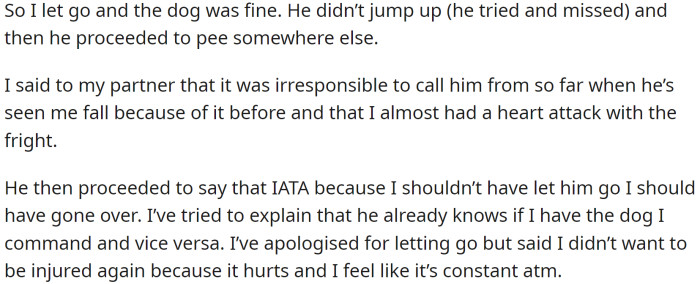
OP expressed their disapproval, but their partner believes they are wrong
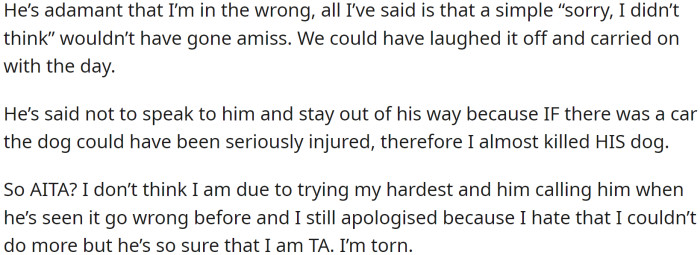
OP posted an edit:

From a psychological perspective, the woman's reaction may stem from an instinctual response to perceived threats, a phenomenon supported by research in the field of evolutionary psychology. The tendency to prioritize safety in personal relationships often leads individuals to make decisions that may appear harsh to outsiders.
The dynamics of pet ownership can sometimes lead to feelings of resentment or conflict between partners.
Studies show that shared responsibilities often result in misunderstandings, especially if one partner feels burdened by the other's choices.
In this case, the decision to release the dog may reflect deeper issues related to shared responsibilities and emotional strain.
OP has offered the following explanation for why they think they might be the a-hole:

This dog is too big for them - that's clear.
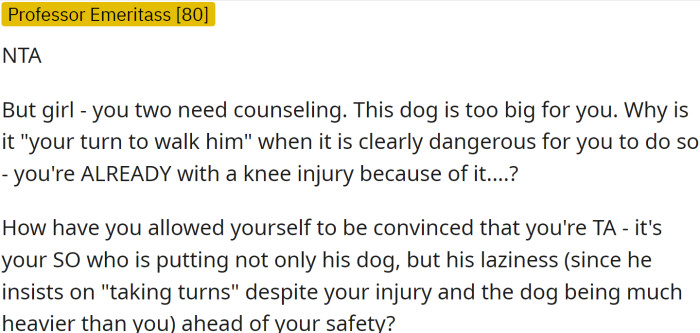
Basic dog training etiquette for people who co-own a dog:

The Role of Safety in Pet Ownership
Safety is a critical factor in pet ownership, particularly when it comes to larger or more aggressive breeds. Studies indicate that understanding an animal's behavior and recognizing potential risks are vital components of responsible pet ownership.
The woman’s decision to prioritize her safety reflects a well-documented response to potential danger, which can evoke strong emotional reactions.
The Impact of Stress on Decision-Making
High-stress situations can cloud judgment and lead to impulsive decisions regarding pet care.
Research from the American Psychological Association indicates that stress can inhibit clear thinking, often resulting in choices made out of desperation.
In this scenario, the pressure to avoid injury may have led to a hasty decision, which could have been better handled through communication.
Red flags?
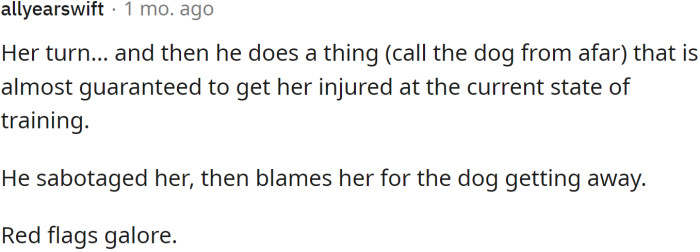
"Maybe this isn’t the dog for you two"

This Redditor asks:

To navigate this situation effectively, it might be beneficial for the woman to engage in open communication with her partner about her concerns. Research emphasizes the importance of sharing feelings and discussing boundaries in relationships to foster understanding and support.
By addressing these concerns collaboratively, they can work towards solutions that prioritize both safety and the well-being of the dog.
To address these challenges, open discussions about pet care responsibilities are essential for maintaining healthy relationships.
Studies suggest that creating shared agreements about pet care can enhance mutual respect and understanding between partners.
In this case, establishing clear boundaries and expectations around pet management could prevent future conflicts.
This sounds abusive
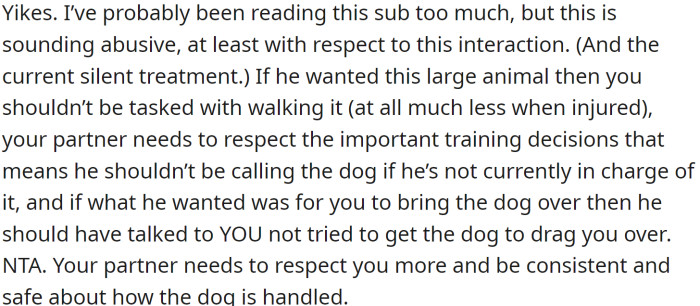
When it comes to getting a dog, size matters. People should not get a dog larger than themselves because the dog can be too strong to handle and potentially dangerous.
Larger dogs require more strength to control and take care of, so it is important to know your own physical limits before selecting a breed. Additionally, larger dogs can be more aggressive than smaller breeds.
While this is not always the case, larger dogs require more training and socialization to ensure they behave appropriately. A dog that is too strong for its owner can be difficult to control and can pose a risk to others.
Finally, larger dogs tend to require more exercise and space to run around and play. If you cannot provide enough space and exercise for your dog, it could develop behavior problems.
Overall, it is important to be aware of your physical strength and limitations when selecting a breed. A dog that is too strong for its owner can be dangerous and difficult to control, so it is important to choose a breed that is the right size for you.
Empathy in Pet Ownership
Building empathy towards pets can enhance the overall dynamic within a household.
Research from the University of Minnesota highlights that understanding the emotional needs of pets can foster better relationships between owners and animals.
In this situation, encouraging each partner to express their feelings about the dog may lead to a more compassionate approach to decision-making.
Psychological Analysis
This scenario highlights the complexities of shared pet ownership, particularly under stress. The decision to release a pet often reflects deeper emotional tensions that require careful navigation.
Encouraging open dialogue about responsibilities and feelings can help partners find common ground and foster a more compassionate approach to pet care.
Analysis generated by AI
Analysis & Alternative Approaches
Decisions about pet ownership can become complicated under stress, often leading to misunderstandings and emotional turmoil.
Research emphasizes the importance of empathy and open communication in navigating these challenges.
Ultimately, fostering a supportive environment can create healthier dynamics between partners and enhance the well-being of the pet.
Building Empathy in Relationships
Empathy plays a crucial role in resolving conflicts in relationships. Studies show that when individuals feel understood, they are more likely to engage in constructive discussions and find common ground.
Encouraging empathetic communication between the woman and her partner can help bridge the gap and facilitate a more balanced approach to pet ownership.
Analysis & Alternative Approaches
In essence, navigating the complexities of pet ownership requires effective communication and empathy, especially when safety concerns are involved. By fostering understanding and collaboration, both partners can work towards a solution that respects their emotional needs and the well-being of the pet.



